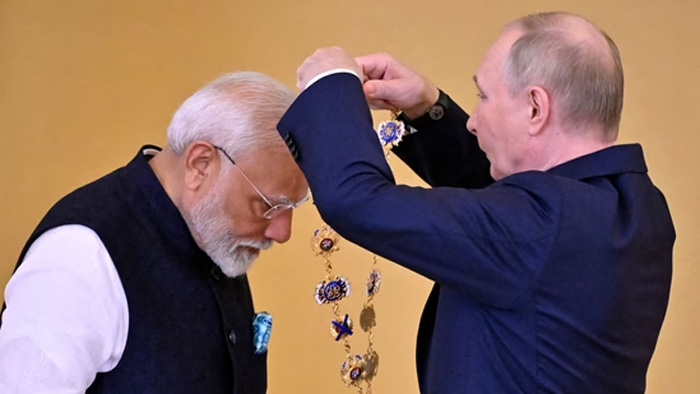PM Modi receives Russia’s most prestigious civilian award from President Putin
Prime Minister Narendra Modi on Tuesday received the Order of St Andrew the Apostle the First-Called, Russia’s most prestigious civilian honour, from President Vladimir Putin during a ceremony at the Kremlin in Moscow.
Putin presented the award to Modi in St Andrew Hall at the Kremlin after the annual India-Russia Summit, which was held after a gap of two years. The formal ceremony was held five years after Putin signed a decree conferring the award on Modi in 2019.
The award recognises Modi’s outstanding contributions to developing the special and privileged strategic partnership between Russia and India and fostering friendly ties between the people of the two countries.
Modi, the first Indian leader to receive the award, said in a post on X: “Honoured to receive the Order of St. Andrew the Apostle. I dedicate it to the people of India.”
While accepting the award, Modi also dedicated it to the traditional bonds of friendship between India and Russia. The recognition, he said, “illuminates the special and privileged strategic partnership” between the two sides.
Established in 1698 by Tsar Peter the Great in honour of Saint Andrew, the first apostle of Jesus and patron saint of Russia, the Order of St Andrew is awarded for the most outstanding civilian or military merit.
In 2019, the Russian embassy in India announced that the decision to confer the award on Modi was made on April 12 that year.
Earlier on Tuesday, Modi laid a wreath at the Tomb of the Unknown Soldier at the wall of the Kremlin. The war memorial is dedicated to Soviet soldiers who died during World War 2.
“A solemn homage to the brave! PM @narendramodi laid a wreath at the Tomb of the Unknown Soldier in Moscow, saluting valour, sacrifice and indomitable human courage,” external affairs ministry spokesperson Randhir Jaiswal said on X.
The red granite monument is decorated with a bronze sculpture of a laurel branch and a soldier’s helmet laid on a banner. In front of it is a five-pointed star with the “Eternal Flame” at its centre. The remains of unidentified Soviet soldiers killed in the Battle of Moscow in 1941 were initially buried in a mass grave at a site where German troops had made the closest approach to Moscow. The remains were relocated to the Kremlin wall in 1966.

